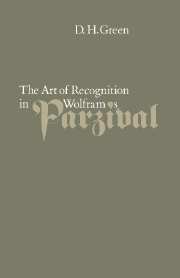Book contents
- Frontmatter
- Contents
- Preface
- Abbreviations
- 1 Possibilities
- 2 Gahmuret (Books I and II)
- 3 Parzival's youth (Books III and IV)
- 4 Parzival's failure (Books V and VI)
- 5 Gawan (Books VII–VIII and X–XIII)
- 6 Parzival and Trevrizent (Book IX)
- 7 Parzival's success (Books XIV–XVI)
- 8 Conclusions
- Appendix A The recognition of Parzival at Munsalvæsche and by Trevrizent
- Appendix B Trevrizent's ‘lie’
- Bibliography
- Index
Appendix B - Trevrizent's ‘lie’
Published online by Cambridge University Press: 24 August 2009
- Frontmatter
- Contents
- Preface
- Abbreviations
- 1 Possibilities
- 2 Gahmuret (Books I and II)
- 3 Parzival's youth (Books III and IV)
- 4 Parzival's failure (Books V and VI)
- 5 Gawan (Books VII–VIII and X–XIII)
- 6 Parzival and Trevrizent (Book IX)
- 7 Parzival's success (Books XIV–XVI)
- 8 Conclusions
- Appendix A The recognition of Parzival at Munsalvæsche and by Trevrizent
- Appendix B Trevrizent's ‘lie’
- Bibliography
- Index
Summary
In Chapter VII, when discussing Trevrizent's final words to Parzival after the latter's call to Grail-kingship, I suggested that the hermit's words about their first encounter (798,6: ‘ich louc durch ableitens list / vomegrâl’) could best be understood if we took the verb liegen not in the sense of its modern counterpart (‘to tell a deliberate falsehood’), but in this context as meaning ‘to say something which, without one's realising it, is untrue’. I am suggesting, in other words, that the medieval verb can be used of uttering a deliberate untruth, but also whenever this untruth is not intended or even grasped by the speaker, and that in this latter respect medieval usage differs from modern.
The presence of deliberate intention in the act of lying was stressed by Augustine in his De mendacio, for he saw that it was not enough to define lying as saying something other than what one knows or means, since that would make it impossible to distinguish between lying and the use of such sophisticated modes of speech as irony, euphemism and polite social formulas, all of which can be classified rhetorically as allegory in the sense of saying other than what is meant.
- Type
- Chapter
- Information
- The Art of Recognition in Wolfram's 'Parzival' , pp. 337 - 341Publisher: Cambridge University PressPrint publication year: 1982



